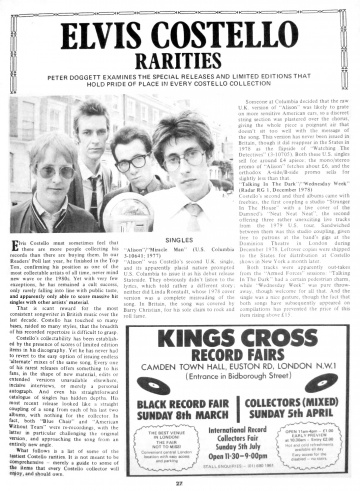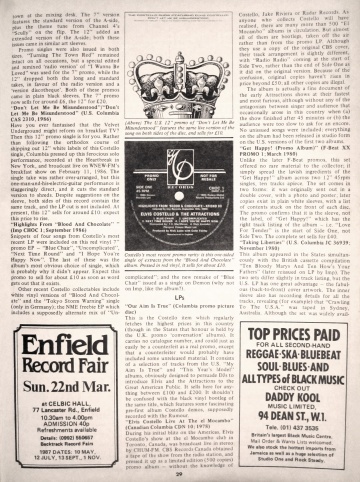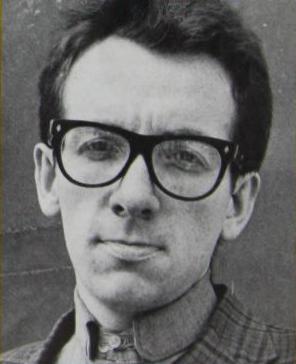|
Elvis Costello must sometimes feel that there are more people collecting his records than there are buying them. In our Readers' Poll last year, he finished in the Top Ten, confirming his position as one of the most collectable artists of all time, never mind new wave or the 1980s. Yet with very few exceptions, he has remained a cult success, only rarely falling into line with public taste, and apparently only able to score massive hit singles with other artists' material.
That is scant reward for the most consistent songwriter in British music over the last decade. Costello has touched so many bases, raided so many styles, that the breadth of his recorded repertoire is difficult to grasp.
Costello's collectability has been establish-ed by the presence of scores of limited edition items in his discography. Yet he has never had to revert to the easy option of issuing endless `alternate' mixes of the same song. Every one of his rarest releases offers something to his fans, in the shape of new material, edits or extended versions unavailable elsewhere, incisive interviews, or merely a personal autograph. And even his straightforward catalogue of singles has hidden depths. His most recent release looked like a straight coupling of a song from each of his last two albums, with nothing for the collector. In fact, both "Blue Chair" and "American Without Tears" were re-recordings, with the latter in particular challenging the original version, and approaching the song from an entirely new angle.
What follows is a list of some of the tastiest Costello rarities. It is not meant to he comprehensive -- merely a guide to some of the items that every Costello collector will enjoy, and should own.
SINGLES
"Alison"/"Miracle Man" (U.S. Columbia 3-10641; 1977)
"Alison" was Costello's second U.K. single, and its apparently placid nature prompted U.S. Columbia to issue it as his debut release Stateside. They obviously didn't listen to the lyrics, which told rather a different story; neither did Linda Ronstadt, whose 1978 cover version was a complete misreading of the song. In Britain, the song was covered by Barry Christian, for his sole claim to rock and roll fame.
Someone at Columbia decided that the raw U.K. version of "Alison" was likely to grate on more sensitive American ears, so a discreet string section was plastered over the chorus, giving the whole piece a poignant air that doesn't sit too well with the message of the song_ This version has never been issued in Britain, though it did reappear in the States in 1978 as the flipside of "Watching The Detectives" (3-10705). Both these U.S. singles sell for around £4 apiece; the mono/stereo promo of "Alison" fetches about £6, and the orthodox A-side/B-side promo sells for slightly less than that.
"Talking In The Dark"/"Wednesday Week" (Radar RG 1, December 1978)
Costello's second and third albums came with freebies, the first coupling a studio "Stranger In The House" with a live cover of the Damned's "Neat Neat Neat", the second offering three rather unexciting live tracks from the 1979 U.S. tour. Sandwiched between them was this studio coupling, given free to patrons at the band's gigs at the Dominion Theatre in London during December 1978. Leftover copies were shipped to the States for distribution at Costello shows in New York a month later.
Both tracks were apparently out-takes from the Armed Forces sessions: "Talking In The Dark" had a certain pedestrian charm, while "Wednesday Week" was pure throw-away, though welcome for all that. And the single was a nice gesture, though the fact that both songs have subsequently appeared on compilations has prevented the price of this item rising above £15.
"I Can't Stand Up For Falling Down"/"Girls Talk" (2-Tone CMS TT-7; January 1980)
This was the most sought-after collector's item of early 1980, which offended the law of gravity by gradually becoming more common instead of less. Costello had been signed to Radar Records in 1978. via a licensing deal from Riviera Global Productions. Radar collapsed towards the end of 1979, and so Elvis's manager Jake Riviera alighted upon the Specials' 2-Tone label as an ideal venue for a holding operation — a one-off single — until Elvis sorted out a deal for the Get Happy album. WEA, who had distributed Radar, were less than delighted: they felt they had a stake in Costello's career by virtue of the success of the records they had distributed for him, and so they obtained a court injunction to stop the 2-Tone single being sold.
By March 1980, the situation was clarified: F-Beat was set up by Riviera as an independent company, but WEA continued to distribute their records. In the meantime, there were several thousand 2-Tone Costello singles to dispose of. These were eventually handed to fans at a Rainbow Theatre gig — and instantly started changing hands in the small ads of the weekly papers for anything up to £40 apiece.
Several months later, Riviera pressed up a few thousand more of the 2-Tone singles, and these were given away at gigs in London and the U.S.A. By this time, however, the single had been issued with the catalogue number F-Beat XX-1. As this new number had replaced the 2-Tone number in the run-off grooves, the second batch of 2-Tone singles carried the F-Beat number, whereas the original copies had 'TT-7' as their matrix number. The first batch now sell for about £25, the second for around L12.
"New Amsterdam"/"Dr Luther's Assistant"/"Ghost Train"/"Just A Memory" (F-Beat XX 5/XX 5E/XX 5P; June 1980)
In theory, the Get Happy album was chock full of potential hit singles. In reality, Costello's only hit from the album came with Sam and Dave's "I Can't Stand Up For Falling Down". Costello is indisputably one of the great singles artists of the last decade or so; despite that he has had only one Top 10 single in this country with one of his own compositions, "Oliver's Army". Collectors have one consolation: his flops will probably be worth a small fortune in another decade's time.
"New Amsterdam" had hit single written all over it — everywhere except in the charts. It appeared in three different forms. The initial 7" retailed at 50p (half the normal price) but featured just two tracks. The EP version included all four, and also appeared as a picture disc; the first 1,500 of these came with a black rim, while later copies were white-rimmed. They sell for £15 and £7 respectively, while the ordinary EP now retails for £4 and the single for £2. And the music? Well, besides the Attractions-backed A-side, the EP included three Costello solo tracks — the first evidence of his mastery of the studio, and his ability to construct songs that combined the ambition of the 1960s with the sensibility of the 1980s. Hidden away on the second side was "Just A Memory", a ballad which was later revived by Dusty Springfield under the title "Losing You".
"Excerpts from the album ALMOST BLUE" (F-Beat EC-1, 1981)
Promos don't come much classier than this four-track 7" EP, which featured "Good Year For The Roses", "Colour Of The Blues", "Why Don't You Love Me" and "Sweet Dreams". The thin paper sleeve was plain white, with the track details typed on a cheap computer and printed out on a sticky label. The label was also white, with the barest of information printed in smudged green ink. And the record sounded as if it had been pressed during an artillery exercise, having been mastered in a frying-pan. Despite this the EP sells for £35, as does a similar 12 exercise used to promote Trust.
"Man Out Of Time (DJ Edit)"/Elvis Costello introduces "Man Out Of Time"/"Man Out Of Time" (F-Beat XX 28-DJ, July 1982)
"Man Out Of Time" might he Costello's be single — or his best song issued as a single, which is not necessarily the same thing. But it still failed to reach the Top 50, despite F-Beat going to the trouble to issue this promo-only version of the single. Side One featured 3'5 7" edit of the song only available on this single, while the second side features an edited version of Costello's spoken introduction to the song from the A Conversation With album, plus the full 5'32" LP track, Recently this single has been selling for up to £ I 5.
"Everyday I Write The Book"/"Heathen Town"/"Night Time" (F-Beat XX 32T)
One of Costello's more successful singles, "Everyday I Write The Book" is more of a curiosity than a rarity. The original 12" release featured the 7" version of the song; but within two weeks that was replaced by a slightly longer remix. Some (but not all) of the second pressing carried a sticker to that effect on the front cover; all of them had the remix information on the A-side label. In the States, meanwhile, two different versions again appeared on the 12" release — a five-minute club remix, and an instrumental.
"I Wanna Be Loved"/"Turning The Town Red" (F-Beat XX 35/XX 35T/XX 35DJ/XX 35Z; June 1984)
Someone in the press decided that "I Wanna Be Loved" was a cover of the Ricky Nelson hit, and that information was repeated in magazines that should have known better. It was actually a song which Costello had discovered on an obscure Japanese compilation of soul singles on the Hi label, and it was the standout track on the otherwise low-key Goodbye Cruel World album. (It also was the subject of Costello's finest promotional video.)
Once again, quality wasn't enough to bring massive success. This time, F-Beat went to
| 



